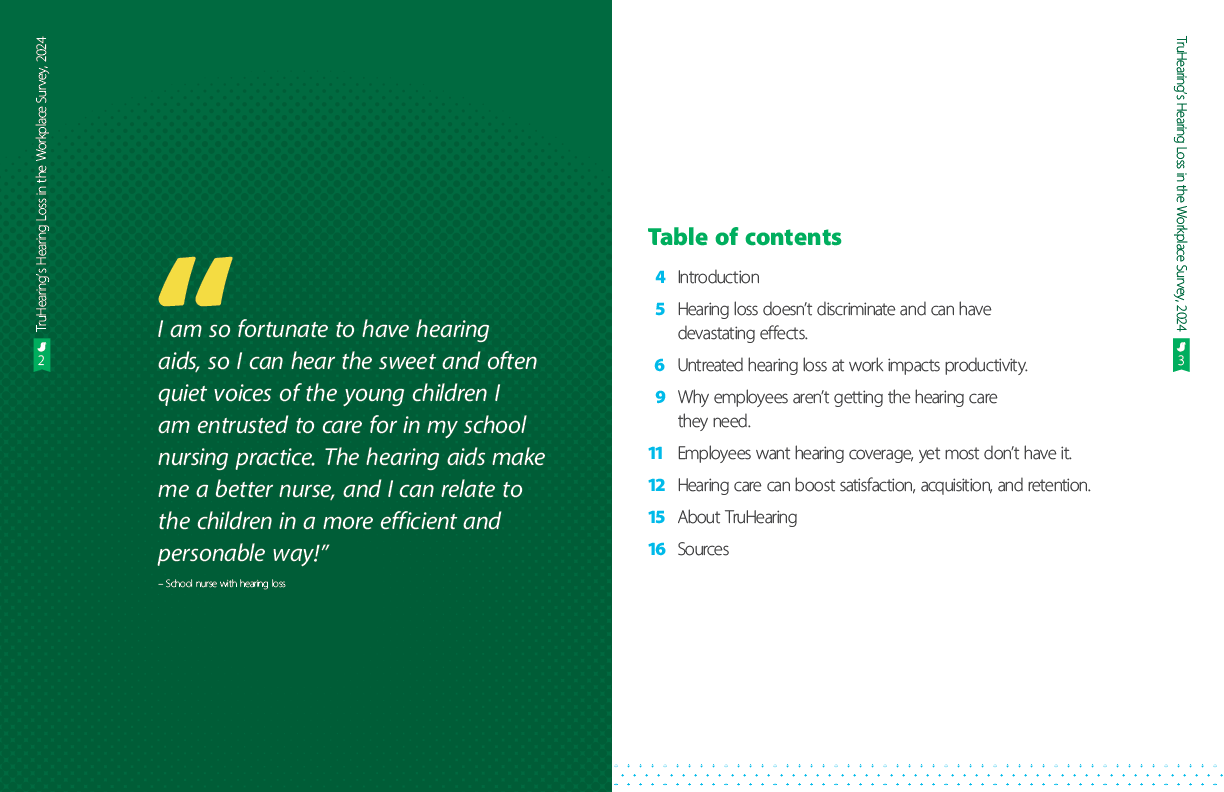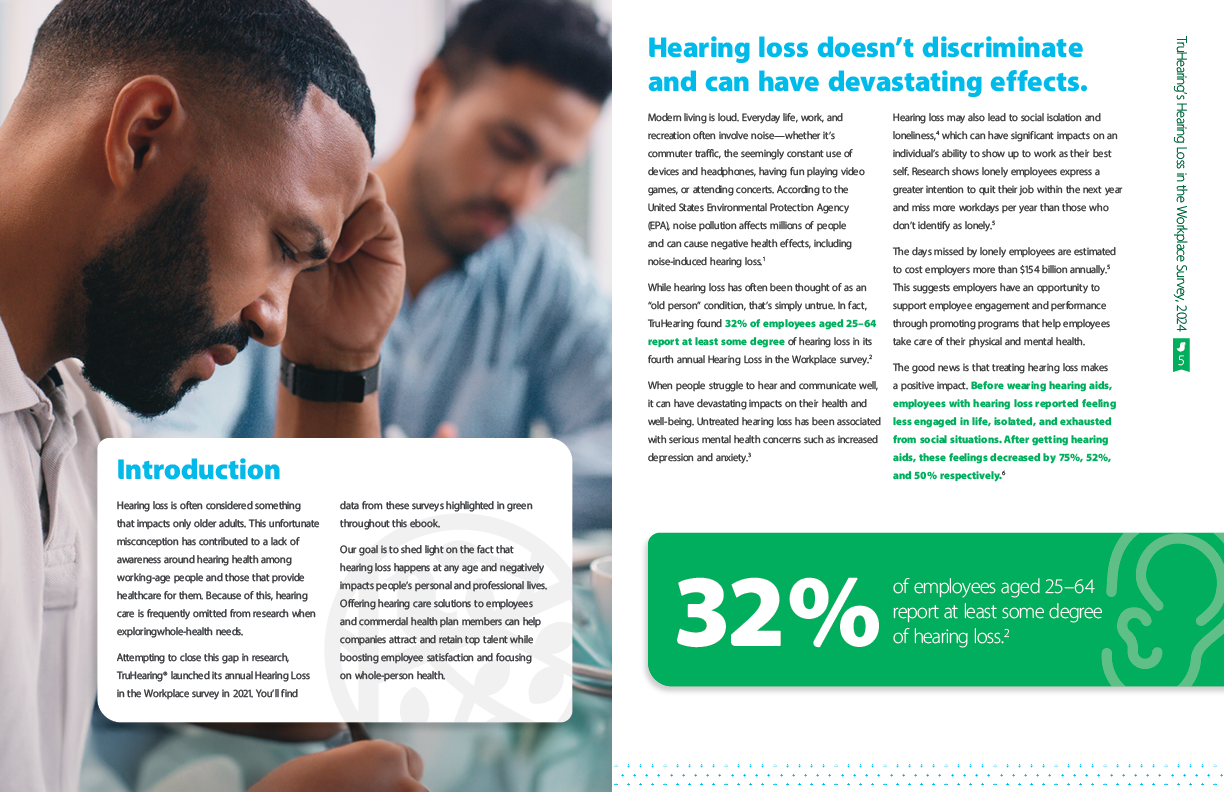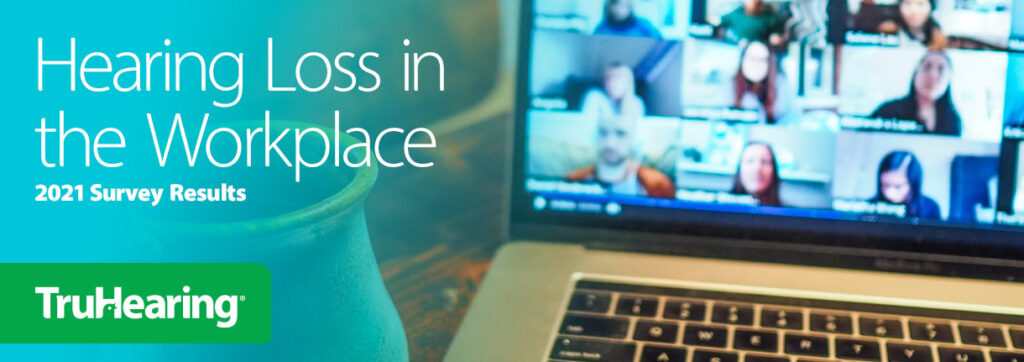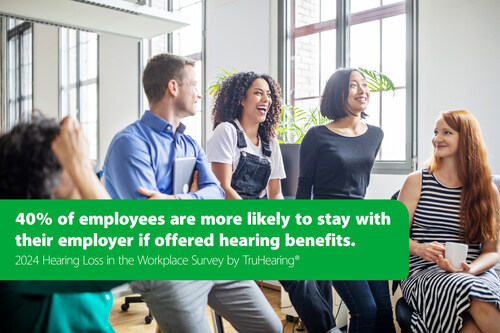Inside the data on hearing health.
The misconception that hearing loss impacts only older adults has led to a lack of awareness and research about hearing health among working-age people and those that provide healthcare for them.
Connor is wearing a TruHearing® Advanced hearing aid.
Connor is wearing a TruHearing Advanced hearing aid.
Inside the data on hearing health.
The misconception that hearing loss impacts only older adults has led to a lack of awareness and research about hearing health among working-age people and those that provide healthcare for them.
Hearing health matters.
TruHearing surveys close the research gap.
Since 2021, TruHearing has invested in a national Hearing Loss in the Workplace survey each year to explore barriers to hearing health and attitudes towards hearing loss, treatment, and hearing benefits.



Get an in-depth look.
This ebook shares insights from years of TruHearing’s Hearing Loss in the Workplace surveys to highlight why employees aren’t treating their hearing loss, the challenges this creates at work, and how hearing healthcare can help.
Hearing benefits are a win-win solution.
Click a topic to learn more about the importance of hearing care solutions for both employees and employers.
In the news
Check out the press TruHearing’s received on the Hearing Loss in the Workplace surveys.
TruHearing Survey Sounds the Alarm: Hearing Healthcare Is Essential for Employee Success

According to findings from TruHearing’s 5th annual Hearing Loss in the Workplace survey, a major disconnect exists between the critical role hearing health plays in employee performance and the level of coverage employers offer to support it. The new data makes it clear: employees overwhelmingly value hearing benefits, and employers who overlook this crucial coverage risk compromising their workforce’s productivity and success.
Hearing Loss Is on the Rise and Gen Z Employees Are All Ears for Action

As Gen Z employees continue to populate the workforce, a new survey reveals that hearing loss and hearing healthcare are increasingly on the minds of younger employees.
TruHearing Survey Reveals Untreated Hearing Loss Contributes to Mental Health Crisis

Hearing loss can negatively impact mental health, but according to a new survey from TruHearing, the market leader in hearing healthcare benefits, the use of hearing aids can help reduce experiences and behaviors linked to poor mental health.
TruHearing Survey Reveals Lack of Basic Health Benefits Hurts Health Equity

Despite efforts by employers to deliver greater health equity through their benefits packages, access to hearing healthcare remains a missed opportunity to support vulnerable employees, according to new research by TruHearing, the market leader in hearing healthcare benefits.
TruHearing® Survey Reveals US Employees Fail to Prioritize Hearing Health Due to Fear of Shame and Stigma

Despite the life-changing benefits that hearing aids can bring to those with hearing loss, many remain hesitant when it comes to pursuing them. That hesitancy can come from a variety of factors, most notably the unfair shame and stigma that often surround hearing aids, and the lack of hearing healthcare coverage provided to US employees to help cover the cost.
How hearing loss in the workplace can affect productivity

As signs of hearing loss build over time, frequent misses and mistakes can take a toll on workers and their employers in the form of reduced productivity. In its first annual “Hearing in the Workplace” survey TruHearing, the market leader in hearing benefits, surveyed working individuals and explored the impact of untreated hearing loss on their productivity. The study found that almost all respondents reported significant challenges to doing their jobs prior to wearing hearing aids.
Despite Increase in DE&I Initiatives, Many Employees Are Still Left Behind
While corporate Diversity, Equity, and Inclusion (DE&I) efforts may be on the rise, those with hearing loss are a population that continues to be left behind by companies when it comes to providing inclusive healthcare opportunities.
TruHearing® survey reveals struggles of those with hearing loss during phone and video calls are underestimated

As remote working continues to be a widespread norm, challenges communicating over the phone and during video calls has taken on new importance, yet many employees may be underestimating the difficulty that untreated hearing loss may be creating in these situations. According to a new research study 1 by TruHearing, the market leader in hearing benefits, 77% of employees who are wearing hearing aids agree that they find telephone and video calls easier to follow and catch more of the discussion now that they wear hearing aids, yet only 45% initially identified this as a challenge they faced while working prior to wearing hearing aids.
TruHearing® Survey Reveals That Few Employers Offer Hearing Benefits, Despite High Demand Among Employees
According to a recent survey from TruHearing, the market leader in hearing benefits, almost all of the general population of employees surveyed (94%) agree that it is at least somewhat important for employers to offer hearing benefits as part of their overall employee benefits package, and more than half (53%) feel it is important or very important.
Employees Note the Disparity: Hearing Benefits Lag Behind Dental, Vision

Health benefits are one of the most attractive offerings an employer can provide, but they often fail to provide enough coverage to meet employee needs and expectations. Dental and vision benefits are typically considered table stakes by employees, with newer health offerings growing in popularity, but for those with hearing loss, coverage can be much harder to find.
Employee Interest in Hearing Benefits Skyrockets, But Only One in 10 Report Coverage

The fourth annual Hearing Loss in the Workplace survey, conducted by TruHearing, the market leader in hearing healthcare benefits, revealed that interest in hearing benefits has drastically increased among working adults.
TruHearing Survey Reveals Hearing Benefits Can Sweeten the Pot for Recruitment and Retention

As recruitment and retention remain a top priority among U.S. employers, a new study reveals that hearing benefits can offer a powerful boost to companies looking to attract top quality candidates and keep them around longer.






